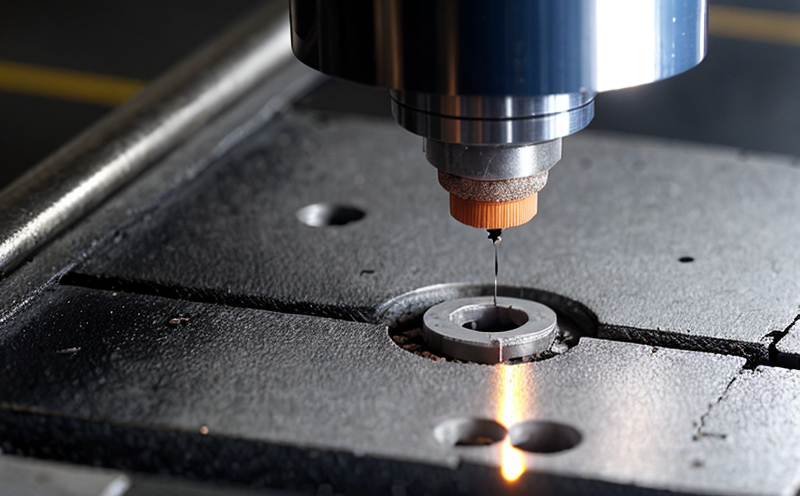IEC 60749-23 Thermal Shock Failure Analysis Testing
The IEC 60749-23 standard is a cornerstone in semiconductor and microchip testing, particularly for failure analysis and defect characterization. This test evaluates the thermal durability of electronic components by exposing them to extreme temperature changes. The procedure ensures that devices can withstand operational conditions without degradation or failure.
The process involves subjecting specimens to rapid temperature cycling between two predefined extremes: typically -40°C and +150°C, though other ranges may be specified based on the specific application requirements. This test is critical for quality assurance in industries where reliability under harsh environmental conditions is paramount.
Failure analysis is a crucial aspect of this testing method. It involves identifying the root cause of component failure through detailed examination and analysis. The failure modes can include cracks, delamination, or other structural changes that may indicate material weaknesses or manufacturing defects. By pinpointing these issues early in the development cycle, manufacturers can implement corrective actions to improve product performance and durability.
The testing method is particularly valuable for semiconductor devices used in automotive, aerospace, and industrial applications where environmental stressors are significant. The IEC 60749-23 standard ensures that components meet stringent reliability requirements, thereby enhancing the overall quality of electronic systems.
Before undergoing thermal shock testing, specimens must be prepared according to specific guidelines provided by the standard. This includes cleaning, drying, and conditioning the samples to ensure consistent test results. The testing apparatus typically consists of a temperature-controlled chamber capable of achieving precise control over both heating and cooling cycles. During the test, sensors monitor critical parameters such as temperature, humidity, and specimen temperature changes.
Upon completion of the thermal shock cycle, detailed analysis is performed on each specimen to assess its integrity. Visual inspection, electrical resistance measurement, and other non-destructive testing methods are used to evaluate the condition of the device. In cases where destructive testing is required, advanced techniques like scanning electron microscopy (SEM) or focused ion beam (FIB) analysis may be employed.
The results of this test provide valuable insights into the thermal stability of semiconductor devices. Engineers can use these findings to optimize design parameters, select appropriate materials, and refine manufacturing processes. By adhering to the IEC 60749-23 standard, manufacturers ensure compliance with international quality standards while enhancing product reliability.
The following table outlines the key steps in preparing for and conducting thermal shock testing:
| Step | Description |
|---|---|
| 1. Sample Preparation | Clean, dry, and condition specimens according to IEC 60749-23 specifications. |
| 2. Temperature Control Setup | Calibrate the temperature-controlled chamber for precise heating and cooling cycles. |
| 3. Test Execution | Subject specimens to rapid temperature cycling between -40°C and +150°C. |
| 4. Post-Test Analysis | Inspect samples using visual inspection, electrical resistance measurement, or SEM/FIB analysis. |
The rigorous nature of IEC 60749-23 testing ensures that only the most robust and reliable semiconductor devices reach market. This method is indispensable for ensuring product safety and performance in high-stress environments.
Scope and Methodology
The scope of IEC 60749-23 thermal shock failure analysis testing encompasses the evaluation of electronic components' resistance to rapid temperature changes. The methodology involves subjecting specimens to controlled cycles between two defined temperatures, typically -40°C and +150°C. This process is designed to simulate real-world conditions where devices may encounter extreme heat and cold.
The test procedure begins with detailed preparation of the samples, ensuring they are clean, dry, and conditioned according to IEC 60749-23 specifications. Once prepared, specimens are placed in a temperature-controlled chamber capable of precise heating and cooling. The apparatus must maintain consistent temperature changes within specified tolerances.
During the test cycle, sensors monitor critical parameters such as specimen temperature, humidity, and ambient conditions. The cycle consists of rapid transitions between the two extreme temperatures, allowing for thorough assessment of thermal durability. Upon completion of the cycle, detailed post-test analysis is conducted to evaluate each specimen's integrity.
The acceptance criteria for this test are stringent, focusing on the ability of the device to withstand specified temperature changes without failure or significant degradation. Compliance with these standards ensures that components meet international quality and reliability benchmarks.
Why Choose This Test
- Ensure compliance with IEC 60749-23 international standards.
- Identify root causes of device failure through detailed analysis.
- Evaluate thermal durability under extreme environmental conditions.
- Optimize design parameters and select appropriate materials for enhanced reliability.
- Enhance product safety and performance in high-stress environments.
- Avoid costly recalls and warranty claims by preemptively identifying defects.
- Maintain consistency across production batches to ensure uniform quality.
- Gain a competitive edge by delivering products that meet the highest international standards.
The IEC 60749-23 thermal shock failure analysis test is essential for industries where reliability and performance under harsh environmental conditions are critical. By choosing this test, manufacturers can ensure their semiconductor devices meet stringent quality requirements while enhancing overall product durability.
Customer Impact and Satisfaction
The IEC 60749-23 thermal shock failure analysis testing ensures that electronic components used in critical applications are reliable and durable. This method enhances customer satisfaction by delivering products that meet the highest international standards, thereby reducing the risk of failures in real-world conditions.
By identifying root causes of device failure early in the development cycle, manufacturers can implement corrective actions to improve product performance and durability. This leads to increased confidence in the quality and reliability of the components, ultimately enhancing customer trust and satisfaction.
The rigorous nature of this testing method ensures that only robust and reliable semiconductor devices reach market. As a result, customers benefit from products that are less prone to failure under extreme environmental conditions. This enhances product safety and performance, leading to greater customer confidence and loyalty.





